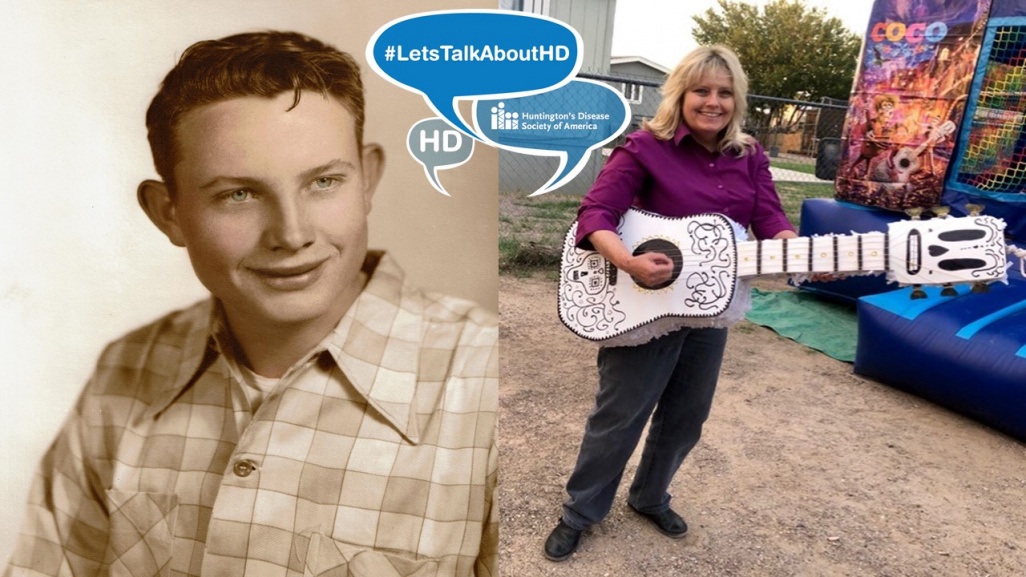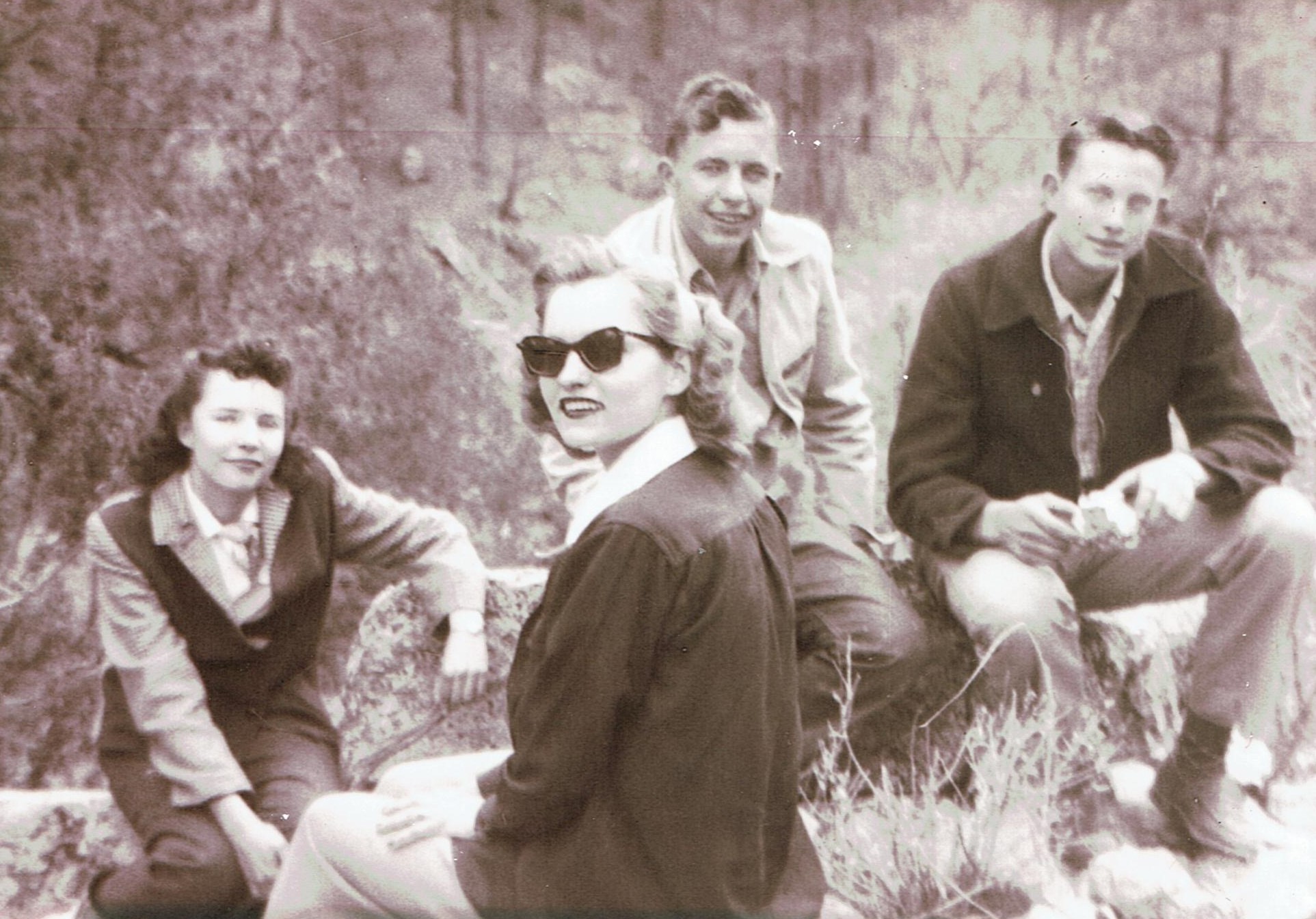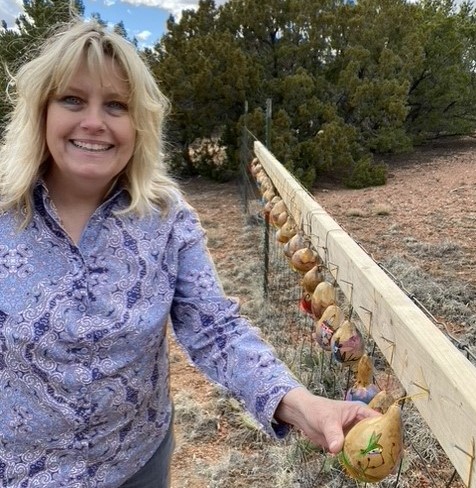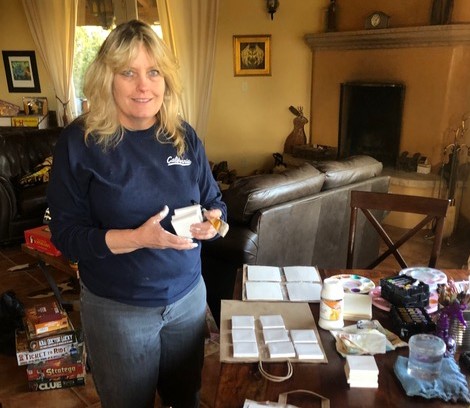
By Matthew Santamaria (msantamaria@hdsa.org)
New Mexico resident Sandy Short has lived her best life as an artist and a realtor. She wants to experience new things in life as her future remains uncertain. Sandy is at risk of inheriting Huntington’s disease (HD).
HD is a fatal genetic disorder that causes the progressive breakdown of nerve cells in the brain. It deteriorates a person’s physical and mental abilities during their prime working years and has no cure. Every child of a parent with HD has a 50/50 chance of inheriting the faulty gene.

“Two of my aunts, my grandmother, and my great-grandfather had HD,” said Sandy. “They didn’t know what it was back then, and during my grand-grandfather’s time, it was just lumped in with dementia. My grandmother was the first person in our immediate family to be diagnosed late in her life.”

In the 1990s, her father tested positive for HD. Her family took him to the VA hospital in El Paso, Texas. The doctor informed the family about the disease and that he needed to give his car keys to Sandy.
“We didn’t know what was going on, and we didn’t know very much about the disease, or how it is carried genetically in families,” Sandy explains. “The doctors prescribed him medication, but it must have been too much because before long it seemed to rob him of his sense of humor and his personality. Or maybe it was HD that did that; we just didn’t have all the information or resources we needed to help him, or us.”
Growing up, her father was a real estate developer running a business alongside her mother. According to Sandy, he had a vision for Las Cruces, New Mexico and assisted in creating an affluent neighborhood in the 1970s and 1980s.
“I don’t know how he did it all,” said Sandy. “In the time leading up to his diagnosis, we didn’t really notice the progression, the leg motions, his jerks, and his instability. But once we couldn’t ignore it anymore, and he seemed to lose interest and ability in running his business, we had to face his decline.”
The symptoms of HD are described as having ALS, Parkinson’s and Alzheimer’s – simultaneously. Symptoms include personality changes, mood swings, depression, forgetfulness, impaired judgement, unsteady gait, involuntary movements, slurred speech, difficulty in swallowing, and significant weight loss.
“We were able to keep him relatively comfortable once he started slipping away from us,” Sandy explains. “He was withdrawn and didn’t laugh like he used to. But he liked to have his bologna sandwiches at lunch, and our dog, Gypsy, was loyal to him and always stayed by his side, especially when he went outside to enjoy the sunshine.”
As her mother got older and her father’s symptoms progressed, Sandy became the primary caregiver.
“We knew we had to support each other through this, and it was hard,” said Sandy. “My mom’s health started failing, and she became very dependent on me. For several years, I was consumed by daily tasks and taking care of everyone.”
In 2005, after Christmas, Sandy’s father came down with a respiratory virus and was in the hospital for three months. Unfortunately, he never recovered and passed away.
“My dad was a great dad,” Sandy explains. “He taught me and my sisters how to fish, swim, change a tire, build things, and appreciate nature. He taught us about New Mexico history by traveling around the state. He also loved to travel and go to Las Vegas with my mom and me. We always had a good time.”
She continues:
“While I know my dad, his sisters, and his mother struggled with this disease that was relatively unknown at the time, I believe they led productive lives and were loved and appreciated deeply by their family,” Sandy explains. “They simply lived their best lives, no matter what.”
When Sandy was ready, she wanted to be tested for HD.
The decision to get genetically tested is difficult to make. Each year, 5-10% are tested. It is never the right or wrong decision to be tested. There are people that see no benefit in knowing that they will develop the disease while others want to know in order to make informed choices about their future. It can take up to several weeks to receive your results from the genetic testing center.
One day, she received a phone call from her doctor that needed to talk to her about the results. She would soon learn that she tested positive for HD.
“I didn’t think I would, but I cried. I felt cheated,” said Sandy. “Why isn’t there a cure yet? I’d already lived a lifetime with this disease, and it didn’t seem fair that I now have to suffer with it, too. I didn’t deserve it, but I guess no one does. I just didn’t get the right cards in the gene pool. I have suffered through depression and anxiety because of this disease.”
Despite the diagnosis, Sandy was determined to live a full and happy life. She wants to try new experiences and take advantage of every opportunity that comes her way. As an artist, she has traveled to art shows, shops, and galleries throughout the Southwest and the West to display and sell her work. To view her website, click here


“I started my art business right out of college, and it not only has supported me financially, it also provides a creative outlet that helps me when I’m feeling discouraged or anxious,” Sandy explains. “When I paint, I can think only of what I’m working on and nothing else. But I know I’ll always want to paint and create. My style might change with HD, but I hope I can do it.”
As Sandy is starting to go to her local HD center, she plans to do everything she can to keep her symptoms at bay and her mind sharp so she can continue making art, helping people buy and sell homes, spend time with her family, and enjoy life.
###
Huntington’s disease (HD) is a fatal genetic disorder that causes the progressive breakdown of nerve cells in the brain. It deteriorates a person’s physical and mental abilities during their prime working years and has no cure. Every child of a parent with HD has a 50/50 chance of inheriting the faulty gene. Today, there are approximately 41,000 symptomatic Americans and more than 200,000 at-risk of inheriting the disease. The symptoms of HD are described as having ALS, Parkinson’s and Alzheimer’s – simultaneously.
The Huntington’s Disease Society of America is the premier nonprofit organization dedicated to improving the lives of everyone affected by HD. From community services and education to advocacy and research, HDSA is the world’s leader in providing help for today and hope for tomorrow for people with HD and their families.
HDSA was founded in 1967 by Marjorie Guthrie, the wife of legendary folk singer Woody Guthrie. Woody died from HD complications when he was only 55 years old, but the Guthrie family legacy lives on at HDSA to this day.
To learn more about Huntington’s disease and the work of the Huntington’s Disease Society of America, visit www.HDSA.org or call 1(800)345-HDSA.
This is a story featuring a personal experience with Huntington’s disease. If you would like to have your story told please contact Matthew Santamaria at msantamaria@hdsa.org
New Mexico resident Sandy Short has lived her best life as an artist and a realtor. She wants to experience new things in life as her future remains uncertain. Sandy is at risk of inheriting Huntington’s disease (HD).
HD is a fatal genetic disorder that causes the progressive breakdown of nerve cells in the brain. It deteriorates a person’s physical and mental abilities during their prime working years and has no cure. Every child of a parent with HD has a 50/50 chance of inheriting the faulty gene.

“Two of my aunts, my grandmother, and my great-grandfather had HD,” said Sandy. “They didn’t know what it was back then, and during my grand-grandfather’s time, it was just lumped in with dementia. My grandmother was the first person in our immediate family to be diagnosed late in her life.”

In the 1990s, her father tested positive for HD. Her family took him to the VA hospital in El Paso, Texas. The doctor informed the family about the disease and that he needed to give his car keys to Sandy.
“We didn’t know what was going on, and we didn’t know very much about the disease, or how it is carried genetically in families,” Sandy explains. “The doctors prescribed him medication, but it must have been too much because before long it seemed to rob him of his sense of humor and his personality. Or maybe it was HD that did that; we just didn’t have all the information or resources we needed to help him, or us.”
Growing up, her father was a real estate developer running a business alongside her mother. According to Sandy, he had a vision for Las Cruces, New Mexico and assisted in creating an affluent neighborhood in the 1970s and 1980s.
“I don’t know how he did it all,” said Sandy. “In the time leading up to his diagnosis, we didn’t really notice the progression, the leg motions, his jerks, and his instability. But once we couldn’t ignore it anymore, and he seemed to lose interest and ability in running his business, we had to face his decline.”
The symptoms of HD are described as having ALS, Parkinson’s and Alzheimer’s – simultaneously. Symptoms include personality changes, mood swings, depression, forgetfulness, impaired judgement, unsteady gait, involuntary movements, slurred speech, difficulty in swallowing, and significant weight loss.
“We were able to keep him relatively comfortable once he started slipping away from us,” Sandy explains. “He was withdrawn and didn’t laugh like he used to. But he liked to have his bologna sandwiches at lunch, and our dog, Gypsy, was loyal to him and always stayed by his side, especially when he went outside to enjoy the sunshine.”
As her mother got older and her father’s symptoms progressed, Sandy became the primary caregiver.
“We knew we had to support each other through this, and it was hard,” said Sandy. “My mom’s health started failing, and she became very dependent on me. For several years, I was consumed by daily tasks and taking care of everyone.”
In 2005, after Christmas, Sandy’s father came down with a respiratory virus and was in the hospital for three months. Unfortunately, he never recovered and passed away.
“My dad was a great dad,” Sandy explains. “He taught me and my sisters how to fish, swim, change a tire, build things, and appreciate nature. He taught us about New Mexico history by traveling around the state. He also loved to travel and go to Las Vegas with my mom and me. We always had a good time.”
She continues:
“While I know my dad, his sisters, and his mother struggled with this disease that was relatively unknown at the time, I believe they led productive lives and were loved and appreciated deeply by their family,” Sandy explains. “They simply lived their best lives, no matter what.”
When Sandy was ready, she wanted to be tested for HD.
The decision to get genetically tested is difficult to make. Each year, 5-10% are tested. It is never the right or wrong decision to be tested. There are people that see no benefit in knowing that they will develop the disease while others want to know in order to make informed choices about their future. It can take up to several weeks to receive your results from the genetic testing center.
One day, she received a phone call from her doctor that needed to talk to her about the results. She would soon learn that she tested positive for HD.
“I didn’t think I would, but I cried. I felt cheated,” said Sandy. “Why isn’t there a cure yet? I’d already lived a lifetime with this disease, and it didn’t seem fair that I now have to suffer with it, too. I didn’t deserve it, but I guess no one does. I just didn’t get the right cards in the gene pool. I have suffered through depression and anxiety because of this disease.”


“I started my art business right out of college, and it not only has supported me financially, it also provides a creative outlet that helps me when I’m feeling discouraged or anxious,” Sandy explains. “When I paint, I can think only of what I’m working on and nothing else. But I know I’ll always want to paint and create. My style might change with HD, but I hope I can do it.”
As Sandy is starting to go to her local HD center, she plans to do everything she can to keep her symptoms at bay and her mind sharp so she can continue making art, helping people buy and sell homes, spend time with her family, and enjoy life.
Sandy has a message for the HD Community:
“Don’t give up. Live your life as best you can. Take advantage of every moment and say “yes” whenever possible. I decided not to hide from this disease but instead to tackle it head-on by being proactive about treatment and my overall health and to not let this get the best of me. I’m eager to see what kinds of new things are on the horizon. My future is bright!”
“Don’t give up. Live your life as best you can. Take advantage of every moment and say “yes” whenever possible. I decided not to hide from this disease but instead to tackle it head-on by being proactive about treatment and my overall health and to not let this get the best of me. I’m eager to see what kinds of new things are on the horizon. My future is bright!”
###
Huntington’s disease (HD) is a fatal genetic disorder that causes the progressive breakdown of nerve cells in the brain. It deteriorates a person’s physical and mental abilities during their prime working years and has no cure. Every child of a parent with HD has a 50/50 chance of inheriting the faulty gene. Today, there are approximately 41,000 symptomatic Americans and more than 200,000 at-risk of inheriting the disease. The symptoms of HD are described as having ALS, Parkinson’s and Alzheimer’s – simultaneously.
The Huntington’s Disease Society of America is the premier nonprofit organization dedicated to improving the lives of everyone affected by HD. From community services and education to advocacy and research, HDSA is the world’s leader in providing help for today and hope for tomorrow for people with HD and their families.
HDSA was founded in 1967 by Marjorie Guthrie, the wife of legendary folk singer Woody Guthrie. Woody died from HD complications when he was only 55 years old, but the Guthrie family legacy lives on at HDSA to this day.
To learn more about Huntington’s disease and the work of the Huntington’s Disease Society of America, visit www.HDSA.org or call 1(800)345-HDSA.
This is a story featuring a personal experience with Huntington’s disease. If you would like to have your story told please contact Matthew Santamaria at msantamaria@hdsa.org
